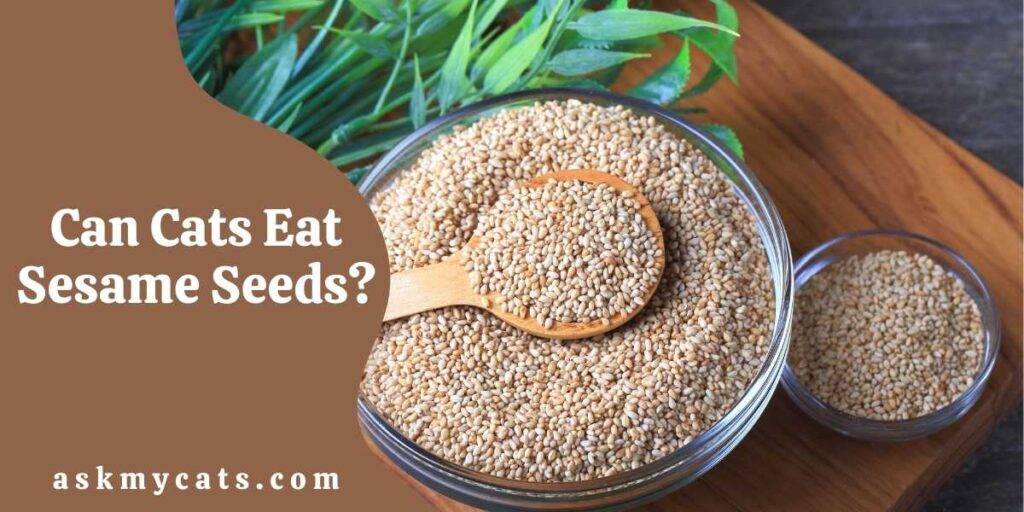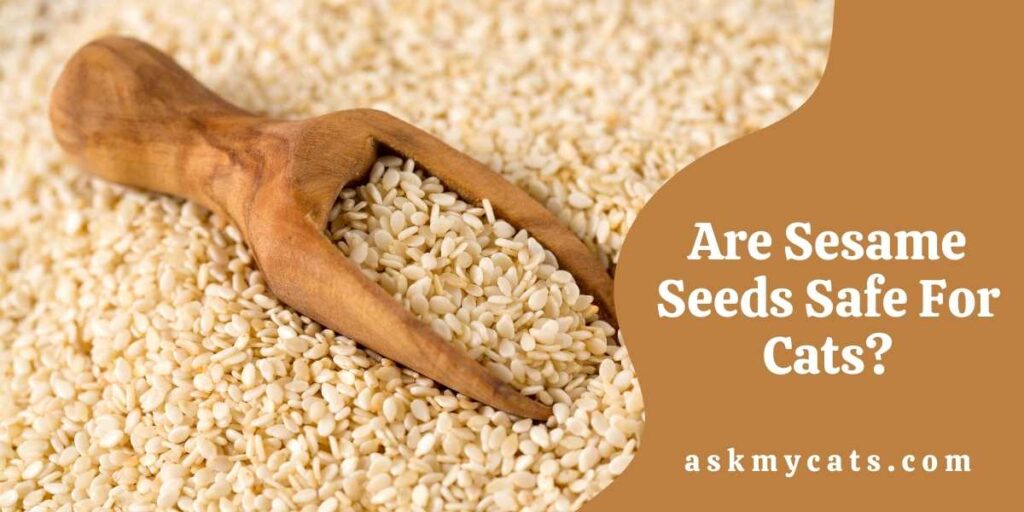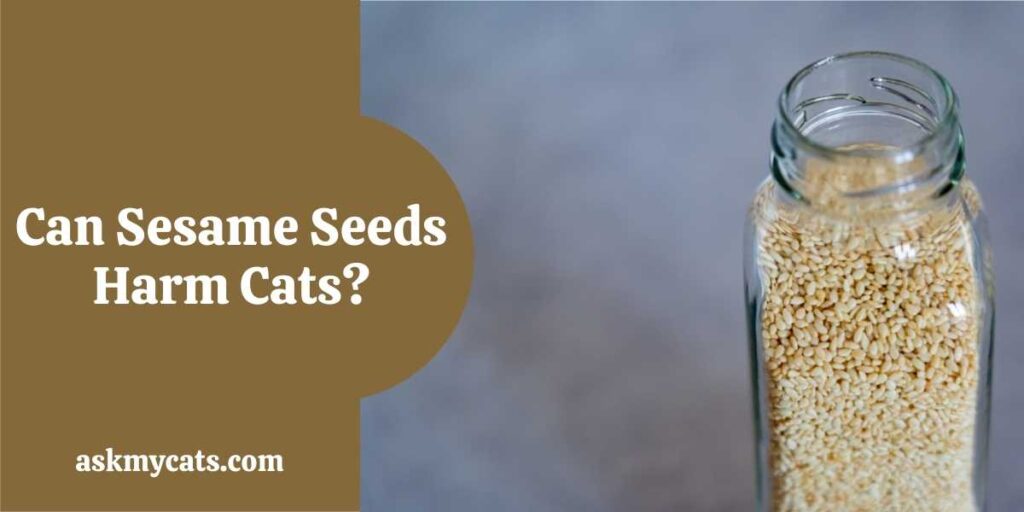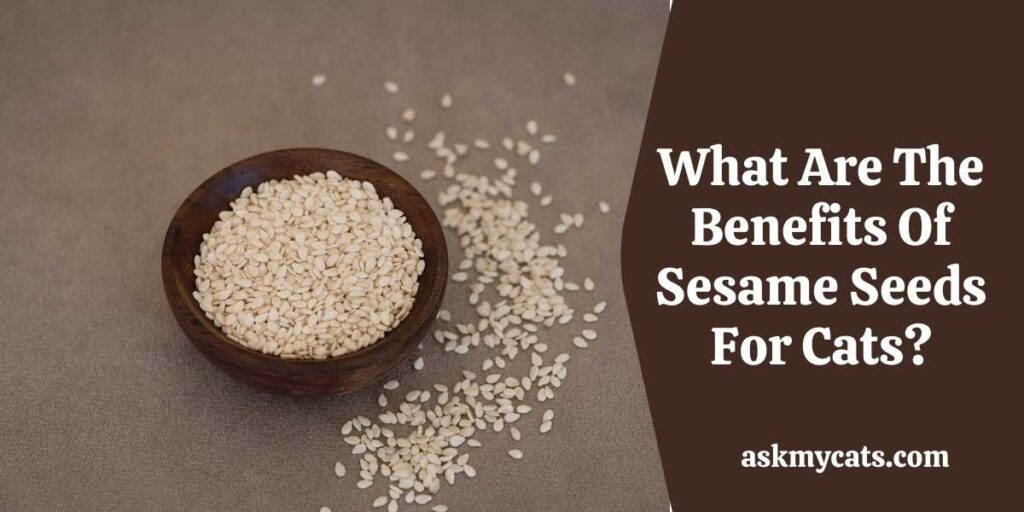Many cat owners are aware of what their cats should and should not consume. However, we don’t always follow the rules.
There will be times when you simply want to share your food with your feline companion. Your cat may sneak behind your back and help herself to human food in rare instances.
When this happens, you may be left with a lot of unanswered questions, especially if it’s the first time the cat has eaten human food. The good news is that cats are not poisoned by all human foods.
However, before introducing your cat to human foods, you should consult your veterinarian. This is especially true for foods based on seeds, such as sesame seeds.
So, can cats eat sesame seeds?
Yes, cats can eat sesame seeds. Sesame seeds, like sunflower seeds, are unlikely to cause your cat any immediate health problems. Furthermore, the seeds have various nutritional and physiological benefits.
This article will let you know how can you incorporate sesame seeds into your cat’s diet and its benefits.


Give Your Cat the Perfect Day
Get the Free Ebook!
Are Sesame Seeds Toxic To Cats?
No, sesame seeds are not toxic to cats.
Cats are not poisoned by sesame seeds. However, you must first understand the details before allowing your pet cat to consume sesame seeds.
There are numerous foods that are suitable for human consumption. Which are poisonous to a wide range of animals and birds.
There are a lot of foods that aren’t harmful. However, you should keep in mind that cats require different foods.
It is never a good idea to feed one animal food to another. Sesame seeds are calorie-dense.
Sesame is also a hot snack in large quantities. It’s possible that your pet cat’s stomach is disturbed or causing diarrhea.
Sesame seeds can be fed to your cat, but only two to three times each month as a snack.
Sesame has a number of qualities. Which will aid in the beautification of your cat’s fur as well as the elimination of skin problems.
For cats, sesame seeds are a fully safe food. It includes healthful fats, proteins, vitamin B, minerals, fiber, and antioxidants, among other things. Which are safe for cats to eat.
As a result, you may feed sesame seeds to your cats. This will improve their digestive system and help them manage their blood sugar, arthritic pain, and cholesterol levels.
Sesame seeds will also make your cat’s fur shine while causing no skin allergies.
In a nutshell, cats can consume sesame seeds. Your cat will not be poisoned by this food. However, if you’re feeding your cat this standard food, you’re doing it wrong. Your cat’s health will decline over time.
Are Sesame Seeds Safe For Cats?
Yes, sesame seeds are safe for cats.

Some seeds, such as sunflower seeds, may be fine for cats, but too much can cause moderate stomach distress.
What about the sesame seed, though? Are they safe for cats to consume?
Sesame seeds are the healthiest and most tasty food available to humans. Iron, magnesium, phosphorus, manganese, copper, and other essential elements are abundant in this meal.
Cats normally do not require any additional nutrients in their daily diet, however, sesame seeds can be given as a special treat.
To begin with, sesame seeds are not poisonous to cats. That doesn’t imply you should give them to your cat on a regular basis or in large quantities. Doing one of these things could put your cat’s health in jeopardy.
Sesame seeds are high in beta-carotene, an essential mineral that is not only important for human health but also for feline health.
It is the only nutrient that has been shown to prevent cataracts in humans and cats. Copper, magnesium, manganese, phosphorus, iodine, and selenium are among the vitamins and minerals found in sesame seeds.
All of these components aid in the prevention of common cataracts as well as the maintenance of a healthy immune, cardiovascular, and digestive system in your cat.
Can Sesame Seeds Harm Cats?
Yes, sesame seeds can harm cats if not fed in moderation and can also cause dental and stomach problems.

Sesame seeds have no official warnings concerning their negative effects on cats.
It will not damage your cat and may assist your cat in multiple ways if you feed it in a balanced manner.
Sesame seeds are a safe meal for your cats to eat. Sesame seeds, on the other hand, should be consumed in moderation by your cat.
Sesame seeds are the most consistent source of omega-6 fatty acids, protein, and antioxidants, for example.
Sesame seeds in little amounts are safe to provide to your cat. Overfeeding, on the other hand, might have serious consequences for their digestion and stomach.
Sesame seeds have the largest fat and oil content, which might upset your cat’s stomach and cause vomiting, diarrhea, and other serious health problems.
Raw sesame seeds are not as safe as roasted sesame seeds. You may also use sesame seeds as an ingredient in a cat toy and overwhelm your cat with their crispy, nutty flavor.
Initially, serve only a few seeds in the shape of roasted grains, and then observe your cat’s response.
If your cat is comfortable and happy with this strategy, you can use these seeds. If your cat exhibits any unusual behavior or has a problem, you should cease feeding them these seeds.
Sesame seeds are a popular addition to human-approved baked goods like artisan bread, but they aren’t always eaten as a snack on their own.
There are a few things to remember if your cat comes into contact with sesame seeds or eats something that contains sesame seeds.
Sesame seeds aren’t necessarily hazardous to your cat, but that doesn’t rule out the possibility of complications.
Sesame seeds are small, and as a result, they can become lodged in your cat’s teeth and be difficult to remove, potentially causing dental problems or decay if not brushed out promptly. If your cat eats sesame seeds, it’s necessary to brush his teeth afterward.
Sesame seeds are similarly unlikely to be eaten on their own; they are more likely to be utilized in a delectable baked dish designed for human consumption.
If your cat eats one of these baked goods containing sesame seeds, it’s the baked good itself, not the sesame seeds, that could cause him problems, as it may contain sugar and other ingredients that could cause gastric discomfort or other issues, such as weight gain, pancreatitis, or diabetes if consumed over time.
As a result, keeping your cat away from sesame-seed-containing baked goods is a good idea just to keep the cat away from baked foods in general.
Check out more details about can cats eat poppy seeds
What Are The Benefits Of Sesame Seeds For Cats?
The benefits of sesame seeds for cats are: –

1. It Is Fiber-Dense
Sesame seeds are an excellent source of dietary fiber, as are nearly all plant-based diets.
Unhulled sesame seeds contain more fiber than hulled sesame seeds, with 30 grams of seeds containing up to 3.5 grams of fiber.
Dietary fiber serves a variety of functions in your cat’s body, including the following:
a. Gets Rid Of Constipation
Dietary fiber, especially insoluble fiber, goes undigested through your cat’s stomach. As a result, it bulks up the animal’s stool, which aids in the relief of digestive issues including constipation and diarrhea.
b. Helps In Weight Management
Sesame seeds, for example, are high in fiber and provide a longer feeling of fullness. As a result, they’re great at curbing your cat’s appetite and limiting the amount of food she may consume in a single sitting. As a result, the cat’s weight is kept under control.
c. Gut-Friendly Bacteria Is Nourished
The bacteria that live in your cat’s alimentary canal are known as gut-friendly bacteria. Dietary fiber improves good digestion while lowering the risk of digestive illnesses by providing these bacteria with needed nutrients.
2. Lowers The Risks Of Inflammatory Conditions
Copper-rich sesame seeds can help to reduce pain and inflammation. As a result, these seeds may help protect your cat from inflammatory diseases like cancer.
Copper also helps your cat’s joints and blood vessels to stay strong. Obesity, diabetes, and kidney disease are among chronic illnesses that can be avoided by giving sesame seeds to your cat.
3. Reduces The Chances Of Heart Disease
High cholesterol and triglycerides, two key risk factors for heart disease, can be reduced by eating sesame seeds.
The seeds are strong in monounsaturated and polyunsaturated fats, both of which help to lower cholesterol levels.
Gamma-tocopherol, a prevalent antioxidant found in sesame seeds, has also been demonstrated to significantly reduce the risk of heart disease in cats.
Lignans and phytosterols are two more cholesterol-lowering substances found in sesame seeds.
Sesame seeds can also help to prevent heart disease by lowering blood pressure. Essential elements including magnesium, vitamin E, and lignans are rich in the seeds.
These ingredients act together to prevent plaque from forming in your cat’s blood vessels, lowering her blood pressure.
4. Keeps Bones Healthy
Sesame seeds are high in calcium, magnesium, manganese, and zinc, all of which are beneficial to bone health.
Feeding sesame seeds to your cat on a regular basis may help to avoid degenerative bone conditions like osteoporosis.
However, these seeds may contain chemicals that prevent important nutrients from being absorbed. Phytates and oxalates are two of these chemicals.
Thankfully, you may lessen the antinutrient effects of sesame seeds by soaking them before feeding them to your cat.
Also, check out can cats eat chia seeds
How To Incorporate Sesame Seeds In Cat Diet?
You can incorporate sesame seeds into the cat diet by roasting them.
Sesame seeds are available in a variety of flavors, including raw, roasted, boiling, and sesame oil.
Only feed your cat-cooked sesame seeds and avoid raw sesame seeds. Also, roasting sesame seeds is the finest way to prepare them for cats.
Some nutritious components in sesame seeds may be denatured by roasting. The roasted seeds, on the other hand, will be easier for your cat to chew.
Roasting also helps to reduce the effects of antinutrients, which could otherwise prevent critical elements from being absorbed from the seeds.
However, make sure you don’t add any salt, spices, or fats to the seeds before roasting them.
Which Cats Should Not Eat Sesame Seeds?
Even while sesame seeds offer various health benefits, depending on the cat, they can be a health concern. Because these seeds are heavy in fat or oil, they can cause digestive problems.
If your cat has a sensitive stomach or an illness like pancreatitis, she should avoid eating sesame seeds since she may vomit or have diarrhea as a result.
If your cat is pregnant, you should limit or avoid sesame seeds totally, as these seeds can increase body heat, which is harmful to both your cat and her baby.
It’s also best to avoid giving it to your kitty if she’s young or old since she won’t be able to digest it correctly, posing a number of health dangers.
Frequently Asked Questions
Can cats have sesame seed oil?
Sesame seed oil, like sesame seeds, is completely safe for cats. Sesame seed oil, in tiny doses, may help to reduce indigestion and renew your cat’s coat. You simply need to give your kitty the oil in moderation.
Can cats get poisoned by sesame seeds?
We know from the previous explanation that sesame seeds are not toxic. Overeating, on the other hand, might cause your cat to have stomach problems, such as diarrhea and vomiting. If you buy sesame seeds for your cat from the market, make sure to inspect them well and keep in mind that they are just cooked. Because it will be hazardous to your cat if it contains any spices or salt.
Final Words
Cats can eat sesame seeds, which are both safe and healthful. However, only feed sesame seeds sparingly to your kitty companion. Keep in mind that your cat is an obligate carnivore and will thrive on a diet high in animal protein.
If you have any questions, ask us in the comments section.
